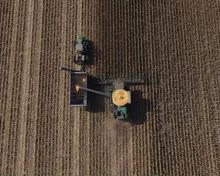
3 Steps to Be Prepared for Crop Insurance
When I was a kid, I always wanted to be a Girl Scout. Unfortunately, with being from a livestock farm, my extra-curricular activities were limited. A motto of the Girl Scouts is to “be prepared.” This crop cycle is no different- you need to be prepared.
Your crop insurance policy will protect you against the risk of weather and/or market pressure but each year we need to prepare those policies to fit your farm needs.
The first step in preparedness is to Know Your Cost of Production. With input costs rising and grain market volatility, knowing your break-even will help you make better financial decisions during times like this.
The second step is to Review. Look at where you’ve been, what worked and didn’t work last year. Do we want to try it again?
The third step in being prepared is Maintenance. Are we ready? Your crop insurance policy is as important as getting a planter ready to plant. We need to look over your policy, see where we need to make adjustments. Are we adding land, switched to an LLC or changing shares?
Using these steps, we can put together a plan so you are, like the Girl Scouts, prepared for this planting season. We begin the spring coverage-pricing period next week through Feb 28th. Spring coverage prices for corn and soybeans will then be set on March 1. Give us a call to review your policy and get a plan together. - Bath Insurance Group, Anya
HAY BARN FIRES
Hay fires are caused when bacteria in wet hay create so much heat that the hay spontaneously combusts in the presence of oxygen. At over 20% moisture mesophilic bacteria release heat-causing temperature to rise between 130°F to 140ºF with temperature staying high for up to 40 days. As temperatures rise, thermophilic bacteria can take off in your hay and raise temperature into the fire danger zone of over 175°F.
Assessing Your Risk: If hay was baled between 15-20% moisture and acid preservatives were used, there is still potential for a hay fire but not as great as on non-treated hay. A moisture tester on your baler can help you know how moisture varies across your field and when to use hay preservative. Without a moisture tester, if you occasionally find darker green damp spots or humidity is high, be sure to monitor for heating. (The Ohio State University Extension Agronomy Team.)
Ag Podcasts and Resources
The Purdue Center for Commercial Ag has many resources available to farmers. Recent podcasts have been posted on the website covering topics including:
- Farmer Adoption Of Enhanced Conservation
- Farm Succession: Human Resources For Transition Planning
- Corn and Soybean Outlook Updates
Future podcasts are planned for this winter (hosted by Brady Brewer) include business structures (LLC, S-Corp, C-Corp, Sole Proprietor); Buy/Sell Agreements; Operating Agreements; Contingency Planning and Retirement Planning.
Other resources at this website include tools such as the 2021 Purdue Crop Cost and Return Guide, which provides estimates of crop income and expenses for low, medium and high producing soils. Another valuable tool is the Crop Basis Tool, which can be used to examine weekly nearby and deferred basis for corn and soybeans in Illinois, Indiana, Michigan, and Ohio.
IS YOUR FARM POSITIONED TO GROW?
The world of Agriculture is continually evolving. In general, the number of farms are decreasing and the size of remaining farms are getting larger. Challenges and opportunities may come at any time. This begs the question, “Is your farm positioned to grow?”
Whether looking to grow because a new family member is coming back into the operation or the operation is attempting to improve profit margins, it’s important to have a well thought-out plan. Being aware of the operations’ current financial situation is the first step. A few important financial indicators to keep in mind: working capital position and how that has changed over time, capital required to meet growth goals, as well as cash flow capabilities. Ag lenders should be able to help discuss and review these.
There are many other important questions to consider before expanding or growing. Is the operation currently profitable? Will the proposed opportunity for growth help the operation improve that profitability? What is the current debt situation? What risks are involved? It is important to consider the worst case scenario, best case scenario, and most likely scenario when evaluating growth options.
Often times when farmers think about growing, the first and only thing that comes to mind is expansion by obtaining more acres. Farm growth really could mean growing sales and becoming more profitable. This may or may not involve more acres, depending on each situation and opportunity. The goal may not be to expand the operation, but to maintain acres and stay competitive in the marketplace. Diversifying the crops grown or livestock raised could also be forms of growth.
As the saying goes, “getting better before you get bigger” may allow the operation to more readily take advantage of those opportunities to expand when available. Many farms have improved and grown over the years due to a high level of financial management.
With today’s agricultural environment, there is certainly risk and uncertainty. Having a well thought out plan and knowing the financial position of the operation can help farmers determine what options for growth are most suitable for success.
Need Crop Insurance? We Have One-Stop Shop
Bath Insurance Group offers crop & livestock insurance. Bath Insurance Group has an office at Bath State Bank in Bath. For more details, please call Anya at the Bank or at 800-209-7238. Visit the web site at http://www.BathInsuranceGroup.com.